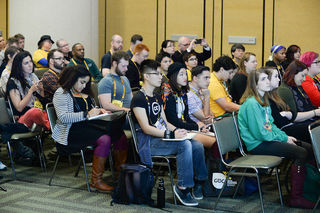Stress
How Much Diversity Can We Handle?
If diversity is good, why does it have to be so stressful?
Posted September 30, 2017

Take a look at your friends and followers on Twitter, Facebook, Tumblr, or Instagram. How many different races are represented? How many sexes? How many genders? How many countries do your friends and followers call home?
How many are old, and how many are young?
How many didn't finish high school? How many did? How many have bachelors degrees, masters degrees, or doctorates?
How many different job titles do your acquaintances have?
How many political parties are represented? How many economic orientations? How many different religions?
How many of your friends think climate change is the most important political issue of our day? How many think government corruption is the most important issue? How many think it's economic inequality? How many think it's terrorism? How many think it's immigration? How many think it's big government? How many think it's patriarchy? How many think it's the national debt? How many think it's racial justice? How many think it's abortion?
That's a lot of "most important issues".
How many are country music fans? How many are classic rock fans? How many are classical music fans? How many are rap and hip hop fans? How many of your friends and followers like pagan folk metal?
And how many of your friends think pineapple should be placed on top of pizza?
If you are like most people these days, your mind encounters a lot of normative diversity -- far more diversity than our ancestors on the savanna had to deal with. Fifty thousand years ago, there were no political parties. Everyone within your circles had the same spiritual beliefs. Everyone listened to some variation of vocal + percussion night club trance type music around the campfire at night (I'm imagining). And nobody put pineapple on their pizza.
There was conflict between tribes, but individuals rarely internalized that conflict. It led to skirmishes and death, not chronic stress and brooding.
There was some conflict within tribes, of course. But there weren't as many people, there weren't as many issues, and there weren't as many ways to carve up our social identities. So it seems likely those folks didn't internalize social conflict to the degree we do today.
This mismatch between modern normative diversity and that experienced in the environment of psychological adaptation rasies a question. Is modern diversity a strain for our modern minds?
Mixed Feelings About Diversity
People have always had mixed feelings about diversity. Peolple flock into diverse cities, but the neighborhoods and churches wind up being segregated along racial and ethnic lines. People tend to cultivate friendships within (and mate within) their religion, more than ouside it. And most of us were taught not to discuss religion or politics in polite company. That's kind of like saying we can tolerate diverse political opinions as long as we don't have to tolerate them too directly.
When the internet first came along many people expected that it would make us more comfortable with diversity. And surely it did. (If you doubt this, then take another look at your social media friends and followers lists). But other trends suggest that the diversity of beliefs, norms, and social identities are being felt as a burden.
Political polarization has been increasing since the internet began. And we have recently been clustering more and more into bubbles of like-minded folks. Some of this is outside the control of the individual, with social media services biasing our feeds toward content we are more likely to agree with. And some of it is within our control as we block, mute, or unfriend people who disagree with us more than those who agree with us.
At the same time we still seem to value diversity. Following Aristotle, John Stuart Mill, and Oliver Wendel Holmes, we tout the importance of having a "diverse marketplace of ideas":
“The ultimate good desired is better reached by free trade in ideas — that the best test of truth is the power of the thought to get itself accepted in the competition of the market.” -- Oliver Wendel Holmes, dissent in Abrams v. United States (1919)
It's a poignant image -- a marketplace of ideas, with each idea competing for mindshare in society. And like most markets, this market is made even better when there is a wide variety goods from which to choose. And it's hard to deny that, if we want to know more in the future than we know now, we have to allow some new ideas in and let them do battle with the old ideas.
In his book "The Difference", Scott Page developed a mathematical model showing that in many precisely defined (but not uncommon) situations cognitive diversity leads to more creative and more effective solutions to engineering and policy problems. His full argument would require some setup, but this is how he summarizes the situation:
“Progress depends as much on our collective differences as it does on our individual IQ scores.” ― Scott E. Page, The Difference
In other words, the diversity of your workforce can be more important than the average IQ of your workforce, if you want your company to solve problems well.
And we value diversity for many other reasons as well. If you are a bit bothered by the fact that all of the "experts" mentioned or cited above are white and male, you probably value diversity.
If you think Google and other Silicon Valley tech firms should hire more women and minorities, then you probably value diversity.
If you become bored when you've listened to one kind of music too long, then you probably value diversity.
But then, if so many of us value diversity, why do we find ourselves shrinking away from it at times?
Dealing With the Costs of Diversity
If you were raised as an Evangelical Christian, and you go to college, and you encounter Catholics, Muslims, and Atheists, you have to figure out how to get along with them. And you also have to figure out what you really believe. And, if you start to question your own upbringing, that might make things very awkward when it's time to sit down around the table with your family at Thanksgiving.
If you grew up in a largely white neighborhood, and never thought about the world in terms of race, and never had a problem with the handful of minorities in your school, and maybe even remember them being among the cool kids, and then you go to a racially diverse city, and start to hear murmurs of racial tension, you might well start to feel the strain of diversity.
Now you have to think more carefully when you speak in public. Now you have to wonder how your gestures and body language are being interpreted. Now you have to wonder if the minorities in your home town were really as content as they seemed to be. And now you have to hear about, and maybe even care about, injustices you didn't know still existed.
If you grew up Republican, and your idea of being edgy was dabbling with Libertarianism, and then you meet a reasonable Socialist, and they didn't sound nearly as crazy as the radio talk show host told you they would, you might experience some cognitive dissonance.
What do you do then? What do you do in any of these cases?
Do you engage with an open mind and try to figure out how to take the best parts of your upbringing and mix it with the best parts of other people's upbringing, so you can be a well-rounded individual? You could. But it's a lot of work. It requires much brooding and re-jiggering of your mental models. And, if you think the end result will be that everyone will like you because your views accommodate everyone's concerns to some degree, you're in for a rude awakening. Not everyone appreciates open-mindedness. In fact many people have a different word for it: "disloyalty".
Or do you stick to your guns, embrace your upbringing tightly, and prepare to do battle. Do you relentlessly advocate for the interests of your tribe, regardless of the costs it might impose on others? Do you engage in political debates with a megaphone at your mouth and your fingers in your ears?
Or do you switch teams and do the same thing for the new team?
Or do you block, mute, and unfollow all the Socialists, Atheists, and Social Justice Warrior types, and retreat back into your safe bubble, so you can focus on your work and your family and leave all the stress of diversity behind?
Of course, white, suburban, Christian, Republicans aren't the only ones who have bubbles into which to retreat. There are dozens of big comfy bubbles out there. And they can all be wonderful places to call home when you've finally grown tired of trying to play nice with "those people".
Sometimes Retreat is Not an Option
But not everyone can retreat to a bubble so easily.
Many of us don't just experience the effects of diversity "out there". We also experience it "in here". For we have encoded a good deal of diversity into our own social identities.
Some fundamentalist Christians decide to major in Biology at University. And every day they must live with the knowledge that, no matter which way they come down on the question of human evolution, someone important to them is going to be very disappointed.
If a man's wife and daughter start blaming a lot of the world's problems on "patriarchy", he might want to ignore it, but he will likely have to engage their concerns. These aren't just two random crazy women. These are the women who do his laundry.
If our workmates, Bob and Alice, are always engaging us about the "issue of the day", and they always seem to disagree with each other, we might have to take sides or play diplomat. Either way we might find ourselves paying more attention to socially charged issues than we might otherwise want to.
Sometimes we find ourselves "caught in the middle." And we must work hard to understand things from multiple points of view. And we must be careful how we register our opinions and questions, because people have set their outrage on hair-triggers, and they won't go out of their way to be charitable.
How much of our collective attention in recent weeks was taken up by the fact that Colin Kaepernick decided to kneel for the National Anthem? How much has been taken up by the Google Memo controversy? How much was taken up by concerns about Charlottesville? How much over concerns about healthcare reform?
Without racial diversity in the nation, or sexual diversity in the workplace, or ideological diversity in congress, none of these controversies would exist. And they wouldn't be taking our attention. We would have to find other things to do with our time, energy, and cortisol.
Maybe we could learn a new skill. Maybe we could spend more time with our children. Maybe we could take peaceful walks in the woods. Maybe we could write poetry, or plant a garden.
Some Friction Is Inevitable
This is not an argument for less diversity. It's an acknowledgement that, whenever you decide to blend together two (or more) subsystems into a super-system, it's always more complicated than it looks. There is always friction. And much of it shows up in unexpected places.
And it's an acknowledgment that all of this friction takes a psychological toll. We're not fully built for it. We're not designed to be outraged all the time. And we're not designed to walk on eggshells all the time.
Most people these days are in the "diversity is good" camp. But that's kinda beside the point. Love it or hate it, it's really too late to turn back now. We're doing this, because the game is up. We're not going to stop integrating women into the workplace. We have to figure out how to do it better. We're not going to stop making sure people of all races, religions, and sexual orientations have equal opportunity to advance in life and receive equal treatment in the criminal justice system. We have to figure out how to do it better. We're not going to stop lifting burdens off of historically marginalized and exploited people at home or abroad. We have to figure out how to do it better.
But Maybe
Much of this friction is necessary. But maybe it doesn't need to be as psychologically costly as it has been in recent years. Maybe we could do a better job addressing and resolving the inevitable conflict. Maybe we could listen to each other a little more and better. Maybe we could be a little more charitable ascribing motives to each other. Maybe we could be a little more effective in the way we go about trying to open up each other's minds to new ideas.
The internet, globalization, and a mixture of liberal and egalitarian values, have thrust an adjustment period upon us. And we are perhaps just now noticing how bumpy this ride is going to be. It's going to take some time and cause some pain. But maybe there are things we can do to speed up the process and reduce the amount of psychological suffering for everyone, so we can take a bit more time to celebrate the good things in our lives.
For some thoughts about more effective interpersonal dialogue, see: 5 Communication Skills That Open People's Minds.




